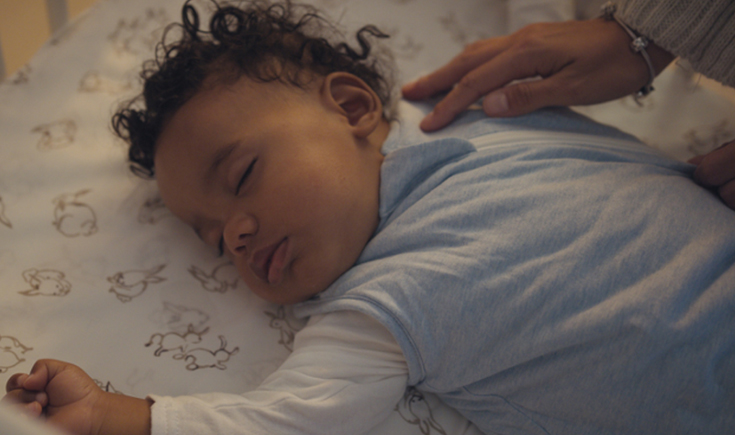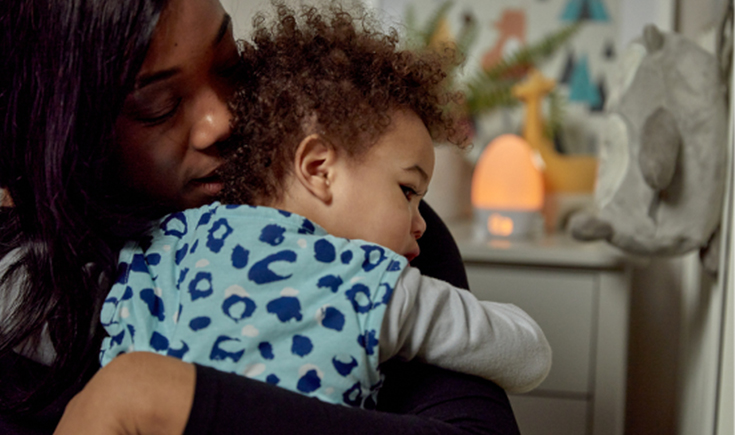

Your newborn baby’s sleep patterns are probably all over the place, which most likely doesn’t fit in with your own sleep needs. It’s completely biologically normal for a baby to be sleepy during the day, and more awake at night in the early weeks and even the first few months until their circadian rhythm is established. This is their internal clock, which isn’t yet synchronised with the external 24 cycle of daylight and darkness.
Although regular night waking is normal and healthy for infants, you can start to get them used to day and night being different from the start. We’ve created the ultimate sleep guide for you, including the essentials you need to optimise sleep for the whole family.
Ultimate sleep guide for newborns
Lighting
During the day, open the curtains and allow as much natural light in as possible. It’s a good idea to do this as early in the morning as you can manage. Morning sunlight helps to establish their body’s natural wake and sleep cycles. Ideally, they will have all naps in a fully lit room or out and about.
In the evening, dim the lights in the house and minimise your baby’s exposure to blue lights from TVs and phones. Blue lights decrease melatonin production, which is the sleepy hormone. Instead of using typical household lamps or night lights for night feeds, it’s a great idea to use a red-hued lamp or rock salt lamp. Ensure the room is nice and dark at night (especially during daylight savings) by using blockout blinds.
Read: What is melatonin and how can it help my baby sleep better?
Sounds
There’s no need to worry about noises during the day, so get them used to the household hustle and bustle. This lets them know that daytime is for play and awake time, and nights are for sleeping. It’s fine if your baby catnaps, as it’s not only normal, but it will help to build up sleep pressure for the night. If your baby likes long stretches, don’t feel that you need to cap their naps. Just follow your baby’s lead, and give them time to adjust.
Then, we need quiet voices and reduced noise at night. Playing white noise in the bedroom helps to recreate the sounds of the womb, and blocks out any household sounds that might startle your baby awake. There are many portable sound/white noise machines on the market if you’d prefer to avoid wifi-based devices, such as phones or tablets.
Read: The fourth trimester from your baby’s perspective
Temperature
During the day, get outdoors with them if you can, pop them in the carrier or pram and go for a walk. Go to a cafe with a friend, or anything else that you enjoy. It’s important that they don’t overheat, so in colder weather, dress your baby in layers and add and remove them depending on if you’re outside or indoors. It’s imperative they don’t overheat as they nap at home as well, so feel their chest, back or tummy, and they should feel warm, not hot.
At night, a cooler room is ideal, somewhere between 16-20°C. Babies sleep better when the room isn’t too warm or too cold, which can be tricky to get the temperature sweet spot. For peace of mind, you might like to use a room thermometer. If you’re using a sleeping bag, choose one with the right TOG rating for the season. For improved sleep conditions, some homes also require humidifiers if the air is dry.
Read: How to choose the right TOG sleeping solution for your baby.
Sensory
We’re often told to avoid overstimulation in the early months because it will lead to sleep issues and fussiness. However, a lack of stimulation and being inside the same four walls day after day usually results in a grumpy baby (and mumma!). Instead, do things that bring you joy, and that nourish your baby’s appetite for sensory stimulation.There’s no need to obsess over naps, awake windows, or clock-watching.
In the evening, keep stimulation to quiet and calm activities. Before bed, this could be skin-to-skin time, a baby massage, or a calming warm bath together as a lovely way to relax and wind down. Create some consistent positive sleep associations each night to signal that bedtime is approaching. Use a room diffuser in the house with a calm baby-safe blend and play some soothing lullabies. Think baby day spa!
Read: The importance of meeting your newborn’s sensory needs.
Nurture
Humans are a contact species. Your baby will most likely be happiest when you’re holding them. For naps and unsettled periods, do what works for you and your baby. Get yourself a really comfortable baby carrier, and wear them often to keep them calm and so you can go about your daily activities.
You can’t love your baby too much, or create ‘bad sleep habits’ at night. The best thing you can do from the start is to nurture your baby to sleep, so do what works for your baby: rock them, cuddle them, and feed them to sleep. Sleep is not something you can teach a baby, but you can promote a sense of security so that when they’re developmentally ready, they will begin to sleep independently. A good lightweight, breathable swaddle will help them to feel more secure, and emulate the snug experience of the womb.
Read: Swaddling your baby – the basics
Expectations
Newborns are hardwired to wake regularly in search of food and comfort for survival. Don’t assume it’s something that needs to be changed or fixed. Night wakings are perfectly normal and healthy, but that doesn’t help you feel any less sleep-deprived. So, instead, you can focus on your own sleep and rest.

Ask for help from family and friends, tag team with your partner on the weekends, go to bed early as often as you can, outsource some household tasks if possible. Be kind to yourself, accept this stage for what it is, and trust that your baby is being a baby (even if they’re not doing what your friend’s baby is doing).
Read: Sleep training: Weighing up the potential risks and benefits
Safety
Finally, we can’t talk about sleep without talking about safe sleeping practices, and this includes naps. If your baby falls asleep in the baby capsule or pram, they must be supervised at all times as they’re not SIDS approved sleeping spaces. Ideally, you want to transfer your baby to their bed or your lap. It’s a great idea to keep a bassinet in the living room with you, so you can also rest and your baby is in the midst of the hustle and bustle of the day.
The safe sleeping advice is to keep your baby in your room for at least the first six months. If you do get some well-deserved time to yourself after your baby drifts off at night, you can keep an eye on them with a baby monitor for peace of mind. Whether you decide to sleep your baby in a bassinet, cot, bedside co-sleeper, floor bed, or you bed-share, make sure you’re informed and educated on the latest safe sleep recommendations (see Red Nose).
Read: Six ways to sleep a baby safely – Avoid SIDS
To enquire or book a baby sleep consultation with Kara, Newborn Baby’s resident sleep expert, please email her























